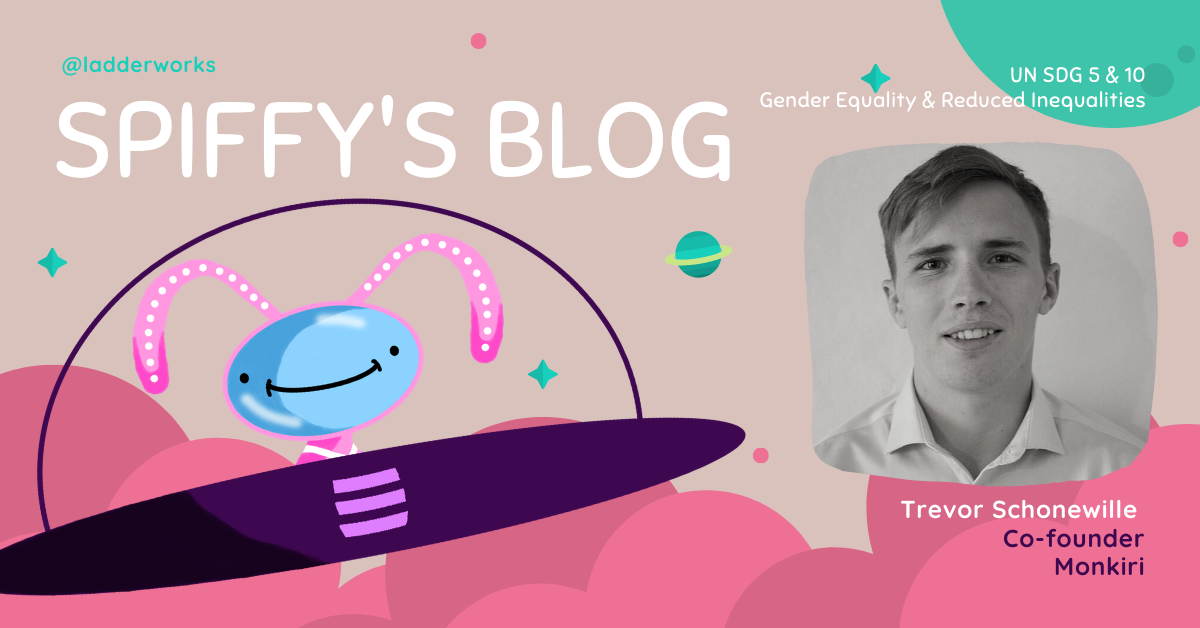Trevor Schonewille: Creating a Path for Financial Education

Hi friends, it’s Spiffy, back again on Planet Earth with an eye on entrepreneurs making the world a more equitable place! I have one more interview for you this week. Today I’m excited to cruise around with Trevor Schonewille, founder of Monkiri.
Spiffy: Trevor, it’s great to be with you today! What in the world is Monkiri and can you tell me what challenge you’re addressing?
Trevor: It’s great to be here, Spiffy! Monkiri's goal is to empower people to make their own informed financial decisions. Did you know that only 33% of adults worldwide have basic financial literacy skills?
Spiffy: That’s way less people than I would have expected, Trevor!
Trevor: Exactly! This means that billions of people lack the skills to use formal financial services like online banking, loan services, insurance and more! When people become financially literate, they have a higher chance of taking control of their economic situation. It also greatly decreases the risk of anxiety, depression and other mental health issues brought on by financial instability and decision making. Outside of our general goal of providing free financial education, we also focus on financial inclusion and reducing inequalities. We focus on financial inclusion because millions of people lack the traditional requirements needed to access formal financial services, such as formal employment, assets, credit histories and more. Women and low-income groups are more likely to be financially illiterate, which is why Monkiri specifically targets these communities.
Spiffy: I see, so the more people know, the more wise they are with their finances. What kinds of things motivated you to tackle this problem?
Trevor: The inspiration for Monkiri happened when I was in Cambodia, interning at an impact investment firm that provides debt financing to microfinance institutions across Southeast Asia. One of my roles was to follow up with microfinance institutions that were late with repayments, and see what was going on. These conversations made me realize that many people struggle with financial literacy. Since this is a global problem, I knew I needed to come up with a scalable, global solution. This is where the idea of creating an education app that focuses on financial education originated.
As for what the name Monkiri means, it’s a bit of a funny story. When I started pitching the concept of a mobile app that educates users about financial concepts, I didn’t have a name for the app yet. One day I was applying for an incubator program that required us to have a name. I was on holiday, driving my motorcycle across Cambodia, and was passing through Mondulkiri province. I thought it was a beautiful place and a cool sounding name. I took 'dul' out of Mondulkiri, and that is how Monkiri came to be!
Spiffy: That’s quite a story, Trevor! Now, you’ve alluded to it, but tell me more about how you’re creating a more equitable place for people in the world.
Trevor: Well, Spiffy, we provide free financial education to empower informed financial decision making. The lessons are designed for learners of all levels, but we focus specifically on vulnerable populations with the most need. We're also building a Financial Literacy Credit Score which provides a risk assessment based on someone's financial education. There are millions of people who don't qualify for formal financial services because they lack the traditional requirements — this aims to help them!
Spiffy: So having access to all this information and education sounds pretty key! What kind of milestones have you achieved?
Trevor: We recently launched a research project in collaboration with the United Nations Economic and Social Commission for Asia and the Pacific (UN ESCAP). This project focuses on identifying the challenges that women entrepreneurs in Cambodia face when starting and scaling their businesses. We will be working with 5,000 women to identify the difficulties they encounter. The results of the study will be used to improve Monkiri lessons and inform financial service providers, NGO's, and government agencies on how to better support these women.
Spiffy: It sounds like something that could have some far-reaching benefits. I am always curious about what kinds of failures entrepreneurs experience — and how they overcome them. Do you have a story to add to my collection?
Trevor: I sure do, Spiffy! Earlier this year the company was completely out of money and I had $53.74 left in my personal bank account. We had just launched our pilot program, but we were not making enough money to cover costs. To keep the lights on, I took a job as a line cook at a ski hill. I worked as a cook from 5:00 a.m. to 2:00 p.m., skied until 4:00 p.m., then spend the rest of my day focused on Monkiri. Eventually, we started to gain traction, and I was able to expand the team and work full-time with Monkiri. I learned that perseverance is key, and taking a step back from something doesn’t mean it’s over.
Spiffy: That’s a real 180. I bet that skiing gave you a little extra clarity and energy to keep going. Do you have any other interesting lessons you’ve learned?
Trevor: Actually Spiffy, my roommate has been teaching me about yoga recently. This is the first time I've tried yoga and I am really enjoying it. Yoga has this amazing balance between exercise and mindfulness, which I love!
Spiffy: I have a feeling about you, Trevor, and I think you’re going to be a mover and shaker. Thanks so much for telling me about your journey with Monkiri. I’m going to check out that Monkiri app! Over and out!
Trevor Schonewille is the co-founder of Monkiri and a complete nut about social entrepreneurship and impact investing. He has held jobs on four of the world’s seven continents, and hopes to work on all of them one day. Outside of work, he goes rock climbing and enjoys making bread. (Nominated by Action Accelerator)


